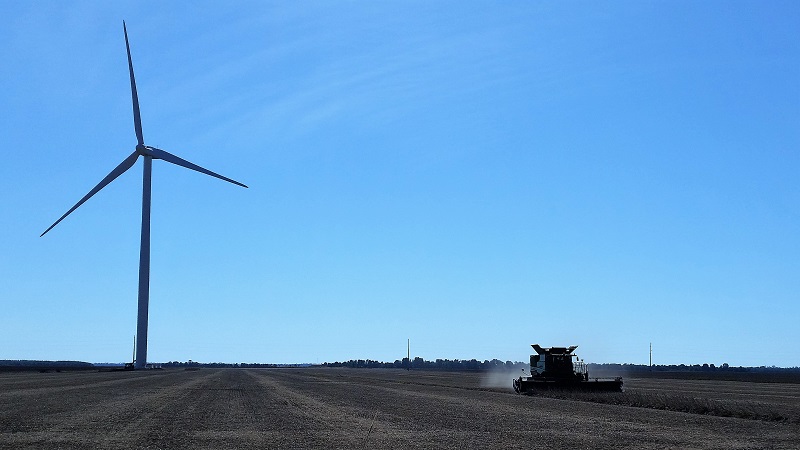 In recent years, the NC General Assembly has debated wind energy repeatedly - and its future may again be on the table this year.
In recent years, the NC General Assembly has debated wind energy repeatedly - and its future may again be on the table this year.
A wind study is under way and a moratorium on new wind energy projects expires at the end of 2018. When the legislature reconvenes on May 16, will lawmakers extend the moratorium? Will we see a flood of new bills designed to block wind energy with unreasonable regulations?
Let your legislators know that you want a forward-looking state energy policy that includes wind energy and other renewables. Tell them you oppose any extension of the wind energy moratorium, as well as obstructionist bills that go beyond reasonable regulation of wind farm siting and permitting.
The NC General Assembly has a mixed record on renewable energy. In 2007, state legislators passed a law requiring electric utilities to get part of their energy from renewables, increasing gradually to 12.5 percent by 2020. This policy, along with a now-expired state tax credit, has helped make North Carolina second in the nation in ground-level installed solar capacity.
Proposals since then to freeze the renewable energy percentage at its present level or reduce the goal have all failed. But state tax credits for renewable energy sources such as solar power were allowed to expire in 2015.
Still, solar development has continued to advance in North Carolina. But the path has been much bumpier for wind energy, even though North Carolina has some of the best onshore wind resources in the region. The state’s first utility-scale wind farm was iput in service in Perquimans and Pasquotank counties in the northeast corner of the state just last year.
Incorporating additional wind power into our energy mix reduces the need to extract and transport fossil fuels. It diminishes the environmental impacts of mountaintop removal to extract coal, oil spills from offshore drilling, and possible water pollution from fracking. And unlike nuclear power, wind farms pose no risk of accidents like those at Chernobyl and Fukushima.
Wind farms can also offer a substantial economic boost to counties where they are located. The Amazon Wind Farm pays more than $500,000 annually in property taxes, making it the largest taxpayer in Perquimans and Pasquotank counties, as well as over $600,000 in lease payments to landowners.
Yet a number of North Carolina legislators have introduced or supported bill after bill to obstruct or halt wind power’s development - including Senators Harry Brown (R - Jones, Onslow) and Bill Cook (R - Beaufort, Camden, Currituck, Dare, Gates, Hyde, Pasquotank, Perquimans), as well as Representatives Beverly Boswell (R- Beaufort, Dare, Hyde, Washington), Pat McElraft (R - Carteret, Jones), John Bell (R - Craven, Greene, Lenoir, Wayne), and Jimmy Dixon (R - Duplin, Wayne).
Wind energy opponents in the NC General Assembly have sought to impose numerous new requirements on wind farms, many of which appear to be aimed at hindering wind energy development. A 2017 bill (“Responsible Wind Energy Implementation”) would have removed decision-making about wind turbine setbacks from local governments and established a statewide one-mile setback from each wind turbine to the nearest property line, as well as a 30-mile distance from any military base.
Extreme limits like these would essentially rule out wind farms in wide swaths of the state, greatly exceed expert recommendations on setbacks, and defy common sense. Would anyone seriously propose a one-mile setback for noisy highways or railroads that serve the public good?
Another bill (“Military Operations Protection Act of 2017”) focused on alleged conflicts between wind farms and the state’s military bases and installations. Yet state law already requires the Department of Environmental Quality (DEQ) to consider potential military impacts as part of the state permitting process, and wind farms also require approval from the Federal Aviation Administration and the Department of Defense Siting Clearinghouse.
None of these bills made it to the House or Senate floor, but wind energy opponents didn’t give up. They succeeded in adding an 18-month moratorium to an unrelated energy bill, barring DEQ from issuing wind farm permits until the end of 2018, during which time a legislative study of possible threats to military operations is to be completed.
Governor Cooper signed the bill despite the moratorium, saying it contained provisions helpful to solar energy development. Immediately afterward, though, Cooper issued an executive order instructing DEQ to work with wind farm developers to ensure that qualifying projects get their permits quickly after the moratorium expires.
Still, the moratorium threw a monkey wrench into plans for two new wind farms in northeastern North Carolina. Whether these projects will ultimately go forward remains unclear.
There are hopeful signs that North Carolinians are eager to move ahead with renewable energy. Numerous cities and businesses have committed themselves to sustainable energy, and even Duke Energy’s unregulated arm that operates outside of North Carolina is moving ahead with wind power. It already has 20 wind projects across the US, including a massive new wind farm in Oklahoma.
It’s time for the NC General Assembly to get on board. Let’s make sure they know that North Carolinians will keep a watchful eye on the session that begins in mid-May - and we’ll expect them to support and promote clean wind energy.
- Research assistance provided by Bill Markham